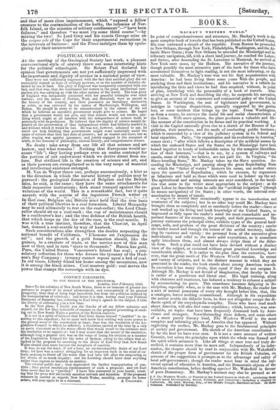POLITICAL GEOLOGY.
AT the meeting of the Geological Society last week, a pleasant conversational style of oratory threw out some interesting hints for the political ethnologist. Sir Robert Peel declared his opinion that governments are not yet sufficiently impressed with the importance and dignity of science in a national point of view.
They were not sufficiently impressed with the fact that national glory did not necessarily depend on feats of military prowess, or on the number of victories ob- tained by sea or land. The glory of England was inseparably connected with one fact, and that was that she maintained her station in the great intellectual com- parison she was carrying on with the other nations of the world. The true glory of England was inseparably connected with her peaceful triumphs over other nations; and the names of Newton, Watt, and Herschell, were as sacred in the history of the country, and their possession an hereditary distinction as noble, as was conveyed by the names of Marlborough, Wellington, and Nelson. He should be sorry to be misunderstood in the nature of the aid which he believed an executive government might give to science. He hoped that a government would not give, and that science would not receive, any- thing which might at all interfere with the independence of science itself, or personally with its professors. He believed that the dignity of science mainly de- pended on the preservation of that independence which had hitherto marked it, and without which it would be lost. He was not, however, ashamed to say, he could not help thinking that governments might more materially assist the cause of science than they had done at present ; not as master and slave, but as allies waging war against ignorance, and jointly engaged in the conquest of truth, IR the domains of philosophy, natural history, and comprehensive science.
No doubt : take away from our life all that science and art bestow, and what remains ? Nothing that Europeans would ac- count "life"; they having perhaps even an undue contempt for the portion of our endowment which we derive direct from na- ture. But civilized life is the creation of science and art, and as their powers are strengthened so is the very scope of material and intellectual existence enlarged. M. Van de Weyer threw out, perhaps unconsciously, a hint as to the direction in which the natural history of politics may be pursued : the geological formation of Belgium and the British isles, he said, is the same ; they have the same attachments for their respective institutions ; both stand tranquil against the re- volutions of the world. This is a remarkable fact, but it quite accords with the maxim of the ingenious French writer on Alaecase, Belgium anc.ffiitain must hold that the true basis of their political liberties is a coal formation. Liberal Monarchy may be said ultimately to rest on the coal-cellar; the Lord Chan- cellor should sit on a coal-sack; the cap of maintenance should be a coalheaver's hat ; and the true defence of the British hearth, that which keeps up the fire of the race, is the coal. scuttle. It was with a true instinct, therefore, that the Chartist, in April last, donned a coal-scuttle by way of hauberk. Such considerations also strengthen the doubts respecting the
national benefit of California. L'homme eat l'expression du sol "; and the growth of a gold formation should, like the guinea, be a creature of trade, at the service now of this man now of that, and in turn "slave to thousands." Russia has gold, Peru, the United States. Vancouver's Island has coal ; a con- solatory reflection for those who foresee the tyranny of the Hud- son's Bay Company : tyranny cannot repose upon a bed of coal. In old times, Liberty found her home among the mountains, now it is among the black mines. Coal masters gold : coal moves the power that stamps the sovereign with its dye.


























 Previous page
Previous page